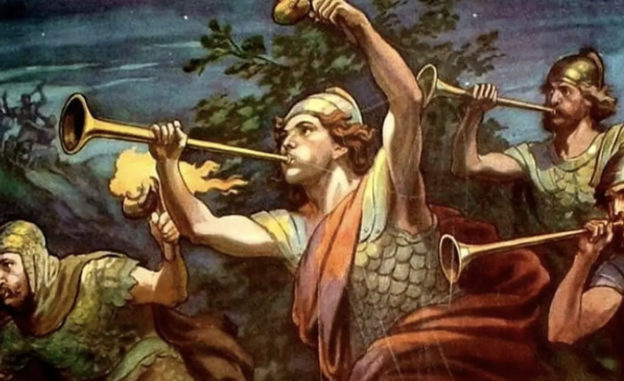After God came to dwell in the tabernacle which Israel built him, the people eventually, after many failures and forty years of wilderness wandering, made it to the Promised Land. There, God was with Israel when they listened to him, as they campaigned to subdue the land of Canaan as their possession and bring God’s judgement on the wicked inhabitants who dwelt there. During those days, the people were led by Joshua, Moses’ successor.
But who would lead after Joshua died? Was it every tribe for itself, or would one person or tribe stand in the gap and lead the people against their foes, and hopefully toward God?
The Book of Judges chronicles the leadership of Israel after Joshua’s death, showing how when they sought to rule themselves, they descended into immorality, chaos, and judgement. True leadership comes from trusting in God’s Divine Leadership, and following those whom God appoints to shepherd his people.
In the first verses of Judges, we see this principle applied. Joshua, who led Israel in its conquest of Canaan had died, leaving no obvious appointed successor unlike when Moses passed (v.1). In this leadership vacuum, Israel turned to God and asked him “Who shall go up first for us against the Canaanites, to fight against them”?
God’s answer was clear: “Judah shall go up; behold, I have given the land into his hand” (v.2). The Tribe of Judah were to take over where Joshua left off. God directed Judah to take the lead, and promised that they would be successful in doing so.
Judah responds in faith, enlisting Simeon to join the fight (v.3). Victory swiftly followed. Judah and Simeon fought, and “the Lord gave the Canaanites and the Perizzites into their hand, and they defeated 10,000 of them at Bezek” (v.4).
This victory was not one of brutal aggression like that happening right now in Eastern Europe, but one of Justice. Adoni-bezek (that is, the King of Bezek) who fled his defeat was captured and punished through losing his toes and thumbs (vv.5-6), which while cruel by today’s different (double-)standards of war, was symbolic.
It ensured he could no longer fight and certainly could not lead in the false and disgusting religious practices (cf. Exodus 29:20) which was a standard part of Canaanite kingship (in a way, not much has changed). Adoni-bezek acknowledged this justice, since he himself dished it out to seventy kings (v.7).
Judah’s leadership, blessed by God, brought further victories. Judah conquered Jerusalem, the place which would become the symbol of God’s People in God’s Place under God’s Rule (v.8). They won in the hill country, in the desert (the Negeb), and in the lowlands (v.9). They captured Hebron, first capital of King David (v.10, 2 Sam 5). Caleb received Hebron as his possession, just as Moses promised (v.20).
Othniel, later the first Judge, leads the conquest of Kiriath-Sepher (renamed Debir) to win the hand of faithful Caleb’s daughter (vv.11-15). There he settles down with his wise wife and starts a family. Faithful to God’s direction.
The Kenites, related to Israel through Moses and his wife, join with Judah and Simeon to drive out the evil Canaanites from the Negeb (vv.16-17). Judah swept through Gaza (later home of arch-enemies the Philistines, v.18). The hill country of Israel firmly rested in Israel’s hands, because Judah listened to God (v.19).
But the first signs of what may become a future problem appear. Judah “could not drive out the inhabitants of the plain because they had chariots of iron” (v.19). They would have to continue to trust in God over time, to then overcome.
Another sign of failure appears, but not because of Judah. Benjamin, entrusted with holding Jerusalem, failed to do so and instead lived with its inhabitants (v.22). Judah’s leadership brings success, but Benjamin will bring disaster again later, unfit to lead.
The theme of this passage is the importance of trusting in God for leadership. Ultimately, God is the one in charge, appointing earthly leaders to direct and shepherd his people. Whether Moses, Joshua, or Judah, all of these are appointed by God.
When we trust God, success follows suit. Judah and those who joined them were successful. There was still some left to do – the lowlands were still not decisively cleansed for God – but God blessed and fulfilled his promises for those who trusted him.
The success of Judah highlights that it was through Judah God intended to bless his people. Ultimately, that success found its truest fulfilment in Jesus, descendent of King David, descendent of Judah. The Lion of Judah. Jesus conquered our true enemies, sin and death, and one day will return to complete the judgement of the wicked nations who worship sin and evil deeds.
Until then, we should trust in God’s Divine Leadership, expressed through his Son Jesus, and through those God appoints to watch over us: his Church Elders. Though fallible like us, still driving out “iron chariot” sins, they lead us to God, and blessing.

